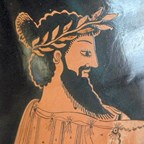The Ionian Revolt (499-494 BC) was the result of the hard effort of the Greek cities on the eastern coasts of the Aegean Sea (also known as Ionia of Asia Minor) to free themselves from the Persian inspection which finally ended up to a strong conflict. During this conflict, the abilities of the Greeks and Persians were challenged greatly. The final dominance of the Persians which was a result of the bad organization and the lack of cooperation through the rebellious Greeks.
Without a capable leadership, underestimating the Persian military force and internally fragmented, the Ionians of Asia Minor led to a revolution which quickly reached to an impasse. The geographer and historian Hecataeus of Miletus tried to advise them promptly proposing the construction of a powerful fleet, foreseeing that the final conflict which would destine the fate of Miletus (the city- centre of the revolution) would take part in the sea. Indeed, the last act of the drama of the Ionian Revolt took place on the island of Lade in the spring of 494 BC.
In front of the city of Miletus, is the small island of Lade, the battle was decided to be fought, which was considered to be the result of the war and the independence of Miletus. The Ionians were informed that the Persians were coming with all their forces (infantry and navy) in the city of Miletus. The Ionians focused their attention to the creation of a numerous fleet, and achieved that as the participation of the other Greek soldiers was great. A significant number (for its era) of 353 ships was collected from various parts of Greece, and made the Persians to consider a new plan; how to break through the Ionian fleet.
The Persian king addressed to its officers, the tyrants, ordering each one of them to try to cause a breach through the Greek army. The king was planning to convince the Greek people to go away from the rest of the allies. He said that if the people would decide to obey him, they would not lose their property and they would be safe, while otherwise they would be slaves, their children would be eunuchs, the virgin girls would be transferred to Bactria (Persian city). So, the Ionian tyrants, during the night, sent their people everywhere to announce this news.
At first, the Ionian people did not give enough importance to the promises or threats of the Persian king. But in the Greek camp things were not easy. Everyone wanted to take command of the fleet. The days passed without result until a very competent leader appeared, Dionysius the Phocaean, who had organized the motley army that had been formed to defend Miletus. In the beginning, they all accepted him. But actually Donysius made considerable efforts to convince the untrained and largely undisciplined army that had need of training, to be prioritized and to execute the orders which came from a common leader of the revolutionary forces. The psychology of the army was hardly tested from the extreme physical tiredness and opposite thoughts as; How they will defeat the enemy? How they will fight as all of them are sick from the hardships of the extreme training? In case of losing, how worse can be the Persian tortures? If they would follow Persians may the situation wouldn’t be so bad? Who is Dionysius, and why should anyone comply with his orders? And many other questions like them which really saddened the Ionian soldiers.
All the above facts had a serious effect for the keeping together of the army and increased the chances to be disrupted. When this bad psychology was around the Ionian soldiers just before the crucial battle, then mathematically the result was expected. Although, it’s interesting that the descriptions in the ancient and medieval texts for mental breakdown of the soldiers under the pressure of the battle are really rare, as this was considered as a lack of bravery.
During the battle
On the day of the conflict, the Ionians had already created a simple front line when the Phoenicians (part of the Persian force) sailed against them. During the battle became the first breach when the 49 of the 60 ships of the Samians who had lined up for battle, left and returned to Samos while the rest 11, remained and fought to the last drop. When Lesvians saw that the Samians were retreating, and they started to retreat, enticing and others do the same. Only the soldiers from the island of Chios stayed and showed bravery until the end. These soldiers, with 100 ships and crews of distinguished citizens, remained with few allies and they completed the naval combat. They achieved to destroy many enemy ships while the same time they had serious losses. At the end, the result was one; the Ionians had lost the battle against the Persian force. The Ionians have not only lost the battle, but also they had to handle with their tragic fate…
It should be given importance not only in the winning battles, but also in those which, by various factors, whether significant or not, ended in defeat. Even those lost battles have always been a driver, a good school for the subsequent development of the ancient Greek Navy. The lack of discipline, the lack of obedience to a common leader and the lack of a specific and well-thought plan of tactics for dealing with the enemy were the two key-points which led the Greeks of Ionia to their defeat.

